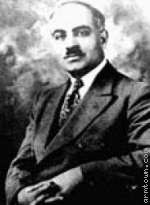The Continental Divide
By Eric FreyFri.
Oct 27, 2006
On October 12 Europe sent two powerful messages to Turkey about the way it should deal with the crimes of the past and the civil liberties of the present: The Swedish Academy awarded the Nobel Prize for literature to dissident Turkish writer Orhan Pamuk, and the French National Assembly passed a bill making denial of the Armenian genocide during the First World War a crime punishable by several years in prison.
The first message was an appropriate honor for a wonderful writer and a fighter for free speech and tolerance. The second one was a misguided attempt to legislate historical truth. Ironically, the French bill resembles the Turkish law under which Pamuk was charged last year for speaking up about the Armenian genocide. Even though the French bill will probably never become law, it may backfire by strengthening nationalist forces in Turkey.
Turkey is a torn country that stands at several crossroads. The mildly Islamist government of Prime Minister Recep Tayyip Erdogan wants to take his country into the European Union and has pressured the union to open formal membership negotiations last year. But that prospect faces broad opposition from the European public and growing resistance within Turkey.
The main foes of Erdogan’s European strategy are not the Islamists, but the country’s secular, radically nationalist forces. This grouping includes most of the military and a powerful lobby of lawyers and state prosecutors. They push for a hard line on Cyprus, the Mediterranean island that has been split into Greek and Turkish sectors since the invasion of Turkey’s armed forces in 1974. And they continue to deny the genocide against the Armenians and make sure that this view remains the law of the land. Intellectuals, journalists, writers and scholars are systematically charged with “denigration of Turkishness” if they dare to speak up on that historic crime (though they are usually acquitted).
The Armenian genocide has a special relevance for Jews. The systematic deportations and killings of around a million Armenians from 1915 to 1917 offered a blueprint to the Nazis. And just as Jews insist that the memory of the Holocaust be kept alive, today’s Armenians demand that Turkey at least acknowledges the horrible injustices committed against them 90 years ago.
Unfortunately, the modern Turkish state seems unable to do so. Even though its founder, Kemal Atatürk, was not personally implicated in the genocide, too many of his key aides were. The denial of that crime thus became a pillar of Turkish national identity. The issue also poisons the relationship with neighboring Armenia, a poor former Soviet republic to which Turkey has closed off all border crossings.
A growing number of Turkish intellectuals, with Pamuk in the lead, consider that attitude a disgrace. And they are encouraged by recent signs of softening by the Erdogan government, including its decision to allow a congress of independent scholars to meet in Istanbul to discuss the Armenian issue and its support for a mixed Turkish-Armenian commission of historians to study the events. But Pamuk and others are highly critical of the French efforts to make genocide denial a crime. For good reasons, they see in the French obsession with the massacres against Armenians a thinly veiled attempt to refuse an Islamic country membership in the European Union...
...Still, Turkey’s inability to face up to the Armenian genocide, just like its refusal to grant cultural rights to its huge Kurdish minority, demonstrates how far the country still has to go before it can be said to have reached European standards of democracy. Turkish nationalism may be the biggest obstacle to E.U. membership, more so than religion or its comparatively low income levels. There is no way that Turkey will ever join the E.U. if it continues to prosecute its brightest minds for demanding historical honesty...
...Whether Turkey ever joins the E.U., the road to membership should be kept open. It is up to Turkish society to banish its ghosts from the past and contain the radical nationalist forces that want their homeland to remain separate from the West. The Nobel Prize for Orhan Pamuk gives the country’s liberals much-needed encouragement. Now it’s up to Pamuk and his allies at home, and not French parliamentarians, to teach Turks that saying “we’re sorry” to Armenians after 90 years is no disgrace.
Eric Frey is the managing editor of the Vienna daily Der Standard
http://www.forward.com/articles/turkey-s-choice-europe-or-amnesia/
Thursday, July 31, 2008
Subscribe to:
Post Comments (Atom)

No comments:
Post a Comment